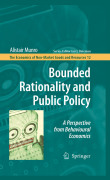
Bounded rationality and public policy: a perspective from behavioural economics
Munro, A.
The economist’s advice to society rests largely on a picture of citizens as infinitely rational beings, shrewd, calculating and above all consistent in their behaviour. But as the last thirty years of economic experiments and field work has revealed, humans are far from perfectly consistent. On the contrary, choices and preferences often seem highly sensitive to context. Systematic deviations from rationality – “anomalies” are widespread and they have been well-documented in the laboratory and the field. What then can the economist say about desirable public policies? Bounded Rationality and Public Policy brings together the work of experimental economists and applies it to public economics. Experimental evidence on anomalies such as the endowment effect, anchoring andmental accounts is presented and critically appraised. The implications of bounded rationality for the efficient boundaries of the state are considered. Pioneers the theoretical analysis of public policy in a context of bounded rationality Brings together public economics and behavioural economics Surveys the behavioural anomalies most relevant in a public policy context Provides a new perspective on stated preference and environmental valuation INDICE: Preface.- 1. Introduction.- 2. Anomalies.- 3. Information, Learning and Markets.- 4. Markets and Reference Dependent Preferences.- 5. Welfare.- 6. Public Policy and Bounded Rationality.- 7. Standard Fiscal Policy and MeritWants.- 8. Agency and Dependency.- 9. Tax Policy.- 10. Framing Matters: Non-standard Fiscal Policy.- 11. Stated Preference and Non-Market Decisions.- References.- Index.
- ISBN: 978-1-4020-9472-9
- Editorial: Springer
- Encuadernacion: Cartoné
- Páginas: 335
- Fecha Publicación: 01/02/2009
- Nº Volúmenes: 1
- Idioma: Inglés
